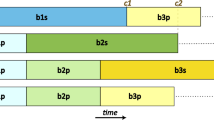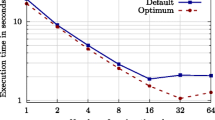Abstract
Current parallelizing compilers cannot identify a significant fraction of parallelizable loops because they have complex or statically insufficiently defined access patterns. We advocate a novel framework for the identification of parallel loops. It speculatively executes a loop as a doall and applies a fully parallel data dependence test to check for any unsatisfied data dependencies; if the test fails, then the loop is re-executed serially. We will present the principles of the design and implementation of a compiler that employs both run-time and static techniques to parallelize dynamic applications. Run-time optimizations always represent a tradeoff between a speculated potential benefit and a certain (sure) overhead that must be paid. We will introduce techniques that take advantage of classic compiler methods to reduce the cost of run-time optimization thus tilting the outcome of speculation in favor of significant performance gains. Experimental results from the PERFECT, SPEC and NCSA Benchmark suites show that these techniques yield speedups not obtainable by any other known method.
Research supported in part by NSF CAREER Award CCR-9734471 and utilized the SGI systems at the NCSA, University of Illinois under grant#ASC980006N.
Access this chapter
Tax calculation will be finalised at checkout
Purchases are for personal use only
Preview
Unable to display preview. Download preview PDF.
Similar content being viewed by others
References
Charmm: A program for macromolecular energy, minimization, and dynamics calculations. J. of Computational Chemistry, 4(6), 1983.
Santosh Abraham. Private Communication. Hewlett Packard Laboratories, 1994.
Utpal Banerjee. Loop Parallelization. Norwell, MA: Kluwer Publishers, 1994.
H. Berryman and J. Saltz. A manual for PARTI runtime primitives. Interim Report 90-13, ICASE, 1990.
W. Blume, et. al. Advanced Program Restructuring for High-Performance Computers with Polaris. IEEE Computer, 29(12):78–82, December 1996.
W. Blume and R. Eigenmann. Performance Analysis of Parallelizing Compilers on the Perfect Benchmarks™ Programs. IEEE Trans. on Parallel and Distributed Systems, 3(6):643–656, November 1992.
W. Blume et. al. Effective automatic parallelization with polaris. Int. J. Paral. Prog., May 1995.
W. Blume et al. Polaris: The next generation in parallelizing compilers,. In Proc. of the 7-th Workshop on Languages and Compilers for Parallel Computing, 1994.
K. Cooper et al. The parascope parallel programming environment. Proc. of IEEE, pp. 84–89, February 1993.
M. Hall et. al. Maximizing multiprocessor performance with the suif compiler. IEEE Computer, 29(12):84–89, December 1996.
T. Lawrence. Implementation of run time techniques in the polaris fortran restructurer. TR 1501, CSRD, Univ. of Illinois at Urbana-Champaign, July 1995.
S. Leung and J. Zahorjan. Improving the performance of runtime parallelization. In 4th PPOPP, pp. 83–91, May 1993.
Z. Li. Array privatization for parallel execution of loops. In Proceedings of the 19th International Symposium on Computer Architecture, pp. 313–322, 1992.
M. J. Frisch et. al. Gaussian 94. Gaussian, Inc., Pittsburgh PA, 1995.
D. E. Maydan, S. P. Amarasinghe, and M. S. Lam. Data dependence and dataflow analysis of arrays. In Proc. 5th Workshop on Programming Languages and Compilers for Parallel Computing, August 1992.
L. Nagel. SPICE2: A Computer Program to Simulate Semiconductor Circuits. PhD thesis, University of California, May 1975.
Y. Paek, J. Hoeflinger, and D. Padua. Simplification of Array Access Patterns for Compiler Optimizations. In Proc. of the SIGPLAN 1998 Conf. on Programming Language Design and Implementation, Montreal, Canada, June 1998.
C. Polychronopoulos et. al. Parafrase-2: A New Generation Parallelizing Compiler. Proc. of 1989 Int. Conf. on Parallel Processing, St. Charles, IL, II:39–48, August 1989.
W. Pugh. A practical algorithm for exact array dependence analysis. Comm. of the ACM, 35(8):102–114, August 1992.
L. Rauchwerger, N. Amato, and D. Padua. A scalable method for run-time loop parallelization. IJPP, 266(6):537–576, July 1995.
L. Rauchwerger and D. Padua. The privatizing doall test: A run-time technique for doall loop identification and array privatization. In Proc. of the 1994 International Conf. on Supercomputing, pp. 33–43, July 1994.
L. Rauchwerger. Run–time parallelization: A framework for parallel computation. TR UIUCDCS-R-95-1926, Dept. of Computer Science, University of Illinois, Urbana, IL, September 1995.
L. Rauchwerger and D. Padua. Parallelizing WHILE Loops for Multiprocessor Systems. In Proc. of 9th International Parallel Processing Symposium, April 1995.
L. Rauchwerger and D. Padua. The LRPD Test: Speculative Run-Time Parallelization of Loops with Privatization and Reduction Parallelization. In Proc. of the SIGPLAN 1995 Conf. on Programming Language Design and Implementation, La Jolla, CA, pp. 218–232, June 1995. 328, 329, 335
J. Saltz, R. Mirchandaney, and K. Crowley. Run-time parallelization and scheduling of loops. IEEE Trans. Comput., 40(5), May 1991.
P. Tu and D. Padua. Array privatization for shared and distributed memory machines. In Proc. 2nd Workshop on Languages, Compilers, and Run-Time Environments for Distributed Memory Machines, September 1992.
R. Whirley and B. Engelmann. DYNA3D: A Nonlinear, Explicit, Three-Dimensional Finite Element Code For Solid and Structural Mechanics. Lawrence Livermore National Laboratory, Nov., 1993.
C. Zhu and P. C. Yew. A scheme to enforce data dependence on large multiprocessor systems. IEEE Trans. Softw. Eng., 13(6):726–739, June 1987.
Author information
Authors and Affiliations
Editor information
Editors and Affiliations
Rights and permissions
Copyright information
© 1999 Springer-Verlag Berlin Heidelberg
About this paper
Cite this paper
Patel, D., Rauchwerger, L. (1999). Principles of Speculative Run—Time Parallelization. In: Chatterjee, S., et al. Languages and Compilers for Parallel Computing. LCPC 1998. Lecture Notes in Computer Science, vol 1656. Springer, Berlin, Heidelberg. https://doi.org/10.1007/3-540-48319-5_21
Download citation
DOI: https://doi.org/10.1007/3-540-48319-5_21
Published:
Publisher Name: Springer, Berlin, Heidelberg
Print ISBN: 978-3-540-66426-0
Online ISBN: 978-3-540-48319-9
eBook Packages: Springer Book Archive




